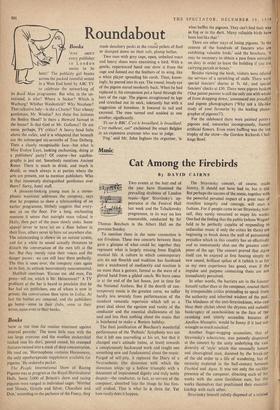Roundabout
Books
`JUST ABOUT
every publisher in London seems to be here!' The publicity girl beams across the packed roomful netted in a West End hotel by ABC TV to celebrate the networking of its Book Man programme. But who, to the un- initiated, is who'? Where is Seeker? Which is Warburg? Whither Weidenfeld? Why Nicolson? That talkative lady—is she a Chatto? That wheezy gentleman, Mr. Windus? ,Are those fine features the Bodley Head? Is there a Howard Samuel in the house? Is that God or Mr. Gollancz? Or are some, perhaps, TV critics? A heavy head bobs above the ine/ge, and it is whispered that beneath are the submerged six-sevenths of Tom Driberg. Then a clearly recognisable face—but what is Miss Evelyn Laye, looking enchanting, doing at a publishers' party? Of course—her autobio- graphy is just out. Somebody mentions Ancient Rome. There is much to drink, and much is drunk, as much always is at parties where the arts are present, not to mention publishers. Who is that immensely distinguished gentleman over there? Sorry, hotel staff.
A pleasant-looking young man in a stereo- phonic waistcoat addresses the company, says that he proposes to show a telcrecording of an earlier programme, blithely suggests that every- one sit on the floor. For a long, enchanting moment it seems that outright mass refusal is likely, then part of the mass slowly sinks. Some appear never to have sat on a floor before in their lives, others never to have sat anywhere else. The telerecording is shown on an outsize screen, and for a while its sound actually threatens to disturb the conversation of the men left at the bar. But they merely raise their voices and the danger passes : we can still hear them perfectly. The film is soon over, the company rises again to its feet, its attitude benevolently noncommittal.
Hubbub continues. 'Excuse me, old man, I'm press—tell me, which is Mr. Heinemann?' A TV prdducer at the bar is heard to proclaim that he has had six publishers, one of whom is now in prison; the conversation then turns to Lolita. M last the bottles are removed, and the publishers go home—some to their clubs, some to their wives, some even to their books.
Beaks 'NOW IS THE time for routine treatment against internal parasite.' The tense little man with the too large overcoat and the woollen neckerchief tucked into his shirt, peered round, his cramped features twisted into a mask of deep concentration. He read on, 'Hormophone contains Hormonexa, the only opotherapeutic supplement available for pigeons.' He ordered a packet.
The People International Show of Racing Pigeons was in progress at the Royal Horticultural Halls. Some 3,000 of Britain's show and racing pigeons were ranged in individual cages. 'Mottled and Mosaic, Grizzle and Silver, Chocolate and Dun,' according to the parlance of the Fancy, they made desultory pecks at the round pellets of feed or slumped down on their soft, plump bellies.
Two men with grey caps, open, unbelted macs and heavy shoes were examining a bird. With a gentle, experienced hand one 'drew it from the cage and fanned out the feathers of its wing, like a whist player spreading his cards. Then, know- ingly, he peered into its eye. The round, beady eye of the pigeon stared insolently back. When he had replaced it, his companion put a hand through the bars of the cage. The pigeon straightened its legs and stretched out its neck; tolerantly but with a suggestion of boredom. It lowered its tail and excreted. The men turned and nodded at one another, significantly.
'Et stir le BBC. C'est le brottillard, le brouillard. C'est inalheur, °id?' exclaimed the smart Belgian in an-expensive overcoat who was to judge.
'Fog,' said Mr. John Ingham the organiser, 'is what baffles the pigeons. They can't find their way in fog or in the dark. Many valuable birds have been lost like that.'
There are other ways of losing pigeons. 'In the interest of the hundreds of fanciers who are exhibiting valuable birds,' said the brochure, 'it may be necessary to obtain a pass from stewards on duty in order to leave the building if you are carrying parcels or boxes.'
Besides viewing the birds, visitors were offered the services of a sprinkling of stalls. There were special fanciers' diaries at 7s. 6d., and special fanciers' clocks at £30. There were pigeon baskets ('Our patent pannier is still the only one with whole of front dropping down,' announced one proudly) and pigeon photographers ('Why not a life-like study of your favourite by the leading photo- grapher of pigeons??).
For the sideboard there were painted pottery pigeons and, somewhat incongruously, framed artificial flowers. Even more baffling was the top trophy of the show—the Gordon Richards Chal- lenge Bowl.

























 Previous page
Previous page